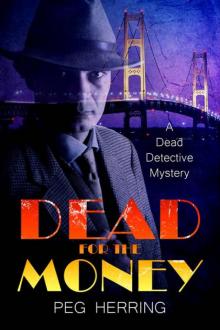- Home
- Peg Herring
The Dead Detective Agency (The Dead Detective Mysteries) Page 5
The Dead Detective Agency (The Dead Detective Mysteries) Read online
Page 5
Nancy watched the moist spots made by Tori’s fingers slowly disappear from the smooth wood surface. “I know. But that memory, along with others from life, will fade as you move toward the next level. As long as you are here on the ship, you have a sense of yourself, and you have the will to remember the past if you so desire. But for most, the details will fade, and what happened on Earth will matter less and less. People here are still individuals, of course. You’ll know you like to play tennis, for example, but you won’t remember the tennis trophy you won at eighteen or the person who was your partner.”
Seeing objection in Tori’s eyes, Nancy added, “This must happen, or the transition to the next step is impossible. As long as you hold those memories, you will miss people and places, harbor anger, even hatred, and suffer insecurities and fears. You must let go of that self in order to become something new, rather like a butterfly.”
“People want to do that?”
“Almost everyone, given time.”
“But someone killed me, ended my life without any indication of why. He just—” she stopped, remembering. “He was young, but his eyes were dead, you know, like there was no one behind them. He wiped his nose on his sleeve, kind of nervously, and asked, ‘Are you Victoria Van Camp?’ When I said yes—” She mimicked the killer’s action with her hand: the slight movement on the trigger, and her unconsciously flinching backward.
“I’m sorry.” Nancy sounded like she meant it.
Tori sat up straighter in her chair, leaning forward in an earnest attempt to explain. “I need to know why it happened.”
Nancy’s eyes rested on the folder before her, but she didn’t open it, merely grazed it again with her fingers. “Then that’s your first task, to settle the questions of your death.”
Tori moved her feet anxiously. “How do I do that?”
“We have ways you can find out.”
“Don’t you know what happened to me? Aren’t you—isn’t everything known here?”
Apparently, honesty was the official policy, but Nancy’s answer tactfully balanced kindness with reality. “Please don’t think us uncaring, but how you got here has no relevance to what happens now. The universe operates on immutable laws. Your life and what happened in it is over. The accounting you face concerns only you.”
Tori sat rapt, listening to eternity explained. She was seeing face to face what had been through a mirror dimly, to paraphrase St. Paul. Ignoring everything outside the room, she zeroed in on Nancy’s voice and the description of what was next. “You move on only when you choose to. If you were ready to forget the past, that part of you would be over right now. Since you feel you cannot, I will help in any way I can.” Nancy paused, again giving Tori time to absorb what was far beyond her experience and expectation.
“I appreciate that, but how is it done?”
Nancy opened the folder, revealing a sticky note attached to the inner cover. Consulting the note, she nodded to herself and slid the folder aside. “There are those who choose to stay between the Portals, people like you, who don’t feel ready to go on.”
Tori thought of what she had seen so far. “Like Mr. Li, maybe? And Cinda?”
Nancy nodded. “Portalists help us educate and serve newcomers. Most of them stay only until they are comfortable moving on.”
Tori relaxed a bit. “So I can stay here? It’s okay?”
Nancy smiled warmly. “Of course it’s okay. You will find in time that you are ready, even anxious, to take the next step.” Her brow puckered briefly with mild frustration. “That’s why we’re always training new help.”
“Like Megan,” Tori supplied. “The pool guy said she was new.”
“Yes, Megan has some rather undeveloped ideas about what existence should be like,” Nancy commented dryly.
Tori considered her options. “If I stay, how do I go about solving my own murder?”
“Let’s take that question up tomorrow, shall we? You’ve got enough to think about for a while.”
Tori had to agree. She rose to leave, but a question of protocol stopped her. Did one shake hands with her Death Counselor? Hug her? She was afraid any physical contact would send her into tears again. To her relief, Nancy remained in her chair, still and solid, like the mooring point she was obviously intended to be.
Before she started for the door, Tori asked a final question, extraneous but important to her at the moment. “Some things you’ve said remind me of the Methodist beliefs I learned as a kid. Others seem to come from other religions. Which denomination is correct? Who has it figured out?”
Nancy’s smile was slightly sad. “Nobody.”
“Nobody? Not one religion is right about the meaning of life and what happens afterward?”
The woman shook her head. “Each has its strengths, but significant errors get in the way of understanding. Mankind simply isn’t capable of thinking beyond itself.” A raised eyebrow reflected a glint of humor. “However, we appreciate the effort.”
Leaving Nancy’s office with much to think about, Tori almost collided with someone at the first intersection. Mumbling an apology, she recognized first the odor of old tobacco, and then the brown pin-stripe suit, and finally the man she had met earlier. He remembered her, too.
“How was your interview?”
“Hard to say. It’s a lot to take in, isn’t it?”
He grinned mirthlessly. “My mind kept screaming, ‘Not fair, not fair!’ that first day. But you get used to it.”
Tori wondered if the man was newly dead, as she was, or if he’d stayed on the ship from choice. What had Nancy called them? Portalists. Not knowing if it was good manners to ask, she didn’t. Still, she sensed she could ask him general things, the way she might question someone at Grand Canyon who’d been there before.
“What do I do now?”
He sniffed derisively. “There’s shuffleboard, or they’re getting together a group to play canasta. Whatever strikes your fancy. They even got harp lessons. Real popular, from what I hear.”
“This is all imaginary…isn’t it?”
The man scratched his cheek absently. “Not imaginary, but not real, either. We don’t understand it because on a scale of one to ten, we’re zeros.” Tori didn’t like the blunt phrasing but supposed it was correct. “A parent makes a kid feel comfortable on a trip by bringing along his favorite blanket or stuffed toy. We get this.”
“I feel a little like I’m being scammed.”
“Me too. I can’t blame them, but I don’t like it.”
“What do you do?”
“Avoid it whenever possible,” he replied succinctly. Tori was about to ask how he accomplished that, but the man continued on his way, his skinny back receding like a dark punctuation mark in the light hallway.
Chapter Eight
You Talk Too Much
In Madison’s final interview on the morning after Tori Van Camp’s murder, the perky Yvonne, front desk receptionist, told in a wide-eyed, emotional narrative how she had almost quit the firm rather than work for James Falk and Donald Pardike.
“Not that I think either of those little pipsqueaks killed Tori,” she whispered with a palm raised toward Madison, “but Pardike thinks he’s the only person here, and Falk’s such a friggin’ perfectionist. When the last secretary quit, someone suggested hiring a new receptionist and putting me in as PA for them. No. Possible. Way.”
Yvonne’s dyed-to-flat-black hair fell forward across her eyes, and she tucked it behind both ears in a gesture that had to be repeated every few seconds. Trim almost to emaciation, her face and figure were composed of points: shoulders, elbows, nose, and chin were all sharp. The effect was attractive, Madison supposed, if a man wanted to date a pretty scarecrow. She pushed the hair back and it immediately came loose and hung in her face once more. He wondered how she got any work done.
Fidgeting in a feminine, rather jerky manner, Yvonne came across as chronically hyper but certainly not guilt-ridden. “Jennise got all fluttery about my ref
using to take the job, but then they found Tori’s resume. She wanted to leave Washington, and I said, ‘There, put the new girl in that spot.’ It worked out great. Mr. Pollard is—was—pleased with her work. The partners liked Tori a lot, Don was thrilled she didn’t complain about his hours, and Deborah goes her own way anyway. The big test was Falk, but he had no complaints. Best of all, she was okay with him.”
“She could handle working for guys like Falk and Pardike?”
“Oh, they could get to her, but she didn’t let it last, you know? Forget it and move on.” Yvonne snapped her fingers to demonstrate the ease with which Tori had handled life, her tone both incredulous and admiring. “She never complained about people, just learned to get along with them. When I asked about it, she said she didn’t mind helping Pardike after hours and Falk’s bark was worse than his bite.” The girl rolled her eyes dramatically. “I felt a little guilty about the fit I threw over the whole thing, and Jennise has sneered about my ‘un-professional attitude’ ever since.”
“How did Tori get along with Ms. Bowdlin?”
Yvonne’s eyes widened and she shook her head, causing very long earrings to dance against her neck. “Better than I do. Tori got a kick out of Jennise’s big ideas.” She looked around, lowering her voice. “Me, I’d like to slug that stupid smile off her face.”
Madison’s first impression had been the same, and he smiled at her honesty. “What’s it like to work for her?”
Yvonne licked her lips and thought about how to best convey the essence of her boss. “Jennise is hard to like, so she’s hard to work for. She’d tell you she’s a caring, competent manager, but all of us ‘little people’ under her thumb see it differently. Abe, the intern you interviewed, calls it patronizing. I had to look it up, but it fits. He says her management style is ‘sensitivity by command.’ Abe’s pretty sharp about people.”
“How does she get away with it if no one likes her?”
“Mr. Loomis oversees the staff, and he approves.” One raised eyebrow said there was more, but she had revealed as much as she dared. Yvonne returned to safer subjects.
“Jennise takes the staff, not the brokers, of course, but the clerical help, to these meetings at the Business Center downtown called ‘Caring Group.’ It’s supposed to—” Here Yvonne made quotation marks with two fingers of each hand—“‘help us understand we’re not just employees but valued, worthwhile associates.’ The group meets every other week to give ‘positive feedback.’ Sometimes we have to hold hands.”
Madison recognized the management style found in psycho-babble paperbacks, usually embraced by administrators who did not have to participate.
Yvonne was on a roll. “Then we go on these ‘Re-energizing Retreats,’ which means a trip to some log hut in the woods where we’re supposed to reveal our fears and ‘deal with negative emotions.’ I hate that! I’m always groping for something to say that will satisfy Jennise without being socially devastating.”
“How did Tori react to this?”
“Like I said, she took it as a joke. She didn’t think it was effective, but she didn’t try to avoid it, either.”
“How about Carmon Calley?” Madison couldn’t picture the self-controlled Miss Calley sharing her inner secrets in group session.
“She never participates. Jennise hates it, but I think Mr. Pollard excused her from attending.”
“Anyone else who doesn’t cooperate?”
Yvonne snickered. “Right before every retreat, Abe’s mother, who isn’t well, has some emergency that keeps him in the city. I happen to know she lives in a very nice assisted living place where they take really good care of her. I’m guessing the emergency is that Abe doesn’t want to play Jennise’s little games.”
The interviews concluded with no indication of who might have wanted Tori Van Camp dead, no recollection of her being afraid, suspicious, or nervous about anything. Madison didn’t meet the senior partner, Amos Pollard, who came into the office only when he pleased, but Yvonne promised to arrange for Madison to interview him as soon as possible. He had learned nothing directly helpful, but understanding the office dynamic was useful. He filed away the hint of a relationship between Tori and Abe Gougeon that Abe hadn’t admitted to.
As the detective left PLK, Craig Loomis lurched out of an office, almost colliding with Madison.
“Sorry, Detective.” Loomis gripped Madison’s arm as if the larger man might topple from the impact of his tall but flyweight frame. “I was looking at some figures.”
“No problem.”
“Anybody here able to help you out?”
Madison grimaced. “Nothing much to start with.”
“Too bad. Tori was a nice girl—I mean, person. Have to watch my phrasing and be PC these days.” His odd, not-quite-focused eyes took on a glint of interest. “The shot. Was it close range?”
They walked the few steps to the entry together, Madison giving as little information as he could without being rude. As he turned to leave, Loomis remarked with a scratch of the head and a Stan Laurel expression, “Someone in the lounge mentioned Tori left here with a man one night after work, looking very friendly.”
“Really. Who?”
“It was Abe Gougeon.”
“The person who reported seeing her?”
“No, the man she was with.”
“Who saw them together?”
Loomis tried, he really did, but in the end his vacant eyes relaxed from their squint and he shrugged. “I forget who mentioned it. We were all talking, you know, and it just came up.” He wandered away, leaving Madison wondering if someone that odd should be trusted with other people’s money.
Madison found his partner, Jaime DeMestrie, behind his impressive desk, his court case having been delayed yet again that morning. Jaime, a weekend garage sale frequenter, had found, some time back, an antique lawyer’s desk that took up most of his half of the office. DeMestrie liked the desk for its ancient patina and classic look. Madison, having little appreciation for aesthetics, had chosen his own battered metal desk from storage because it took up minimal space and left room for the boxes and crates of paper files he refused to surrender either to the basement or computer disks.
The handsome DeMestrie sat sorting through his messages and eating a Twix. Slim as a smart-phone, Jaime nevertheless had a metabolic quirk that seemed to require constant infusions of sugar. He was seldom without a candy bar. For this reason and because he was movie-star handsome, his nickname around the station was “Sweetness.”
Looking like anything but a junk-food addict, Jaime dressed impeccably in clothing that stretched his cop’s salary but was carefully chosen and well cut. He smelled good, too, Madison supposed, if a person needed to smell like anything except a man. Jamie’s dark head was bent close to the surface of the desk due to the fact he wouldn’t wear his glasses. The drawbacks of being hunky, Madison thought. If I needed glasses, what difference would it make to this mug?
Together the men reviewed the case notes. Madison knew later Jaime would reread everything carefully, making notes on unanswered questions and details he found pertinent. Looking at a picture taken before anything was touched, when Tori Van Camp might have been asleep except for the pallor of her skin, Madison was struck by how innocent she looked in death. Had she been an innocent victim?
Why had she died? A random act? Gang initiation? Some nut who imagined she had slighted him in the park? Those things happened, he knew, but why this girl? Why did the nut ascend to the second floor and knock on that particular door? Why had he chosen Tori Van Camp out of Grand Rapids’ almost 200,000 citizens? Questions like that drove him crazy in this job. Knowing there might never be an answer made it worse.
Across the office, his partner pulled his second desk drawer out a foot or so, causing a muted rasp, and rested his heels on it. “Bottom line, Chuck. What’s this about?”
Although DeMestrie and Madison made an odd pair, neither cared about their disparities. They wanted results, and
they focused on who killed Tori Van Camp.
“From what I saw on scene, the girl died instantly from a bullet wound to the heart. She fell where we found her. There was nothing else, according to the techs. No unusual marks, no indication of recent sexual activity. There was no forced entry, no unknown fingerprints, nothing disturbed. It looks like when she opened the door, the guy shot her and left.”
“Are we sure it was a guy?”
“A woman in the building was dragging one of those shopping carts up the stairs. A guy in sweats and a knit cap passed her, but that’s all she noticed. A kid under the staircase might have seen him coming in. She was in the storage unit digging for her skates, but she thinks a tenant went out and someone else came in before the door closed. All she saw was legs going up the stairs, but she remembers the sweats.”

 Macbeth's Niece
Macbeth's Niece KIDNAP.org
KIDNAP.org The Dead Detective Agency (The Dead Detective Mysteries)
The Dead Detective Agency (The Dead Detective Mysteries) Dead for the Money
Dead for the Money